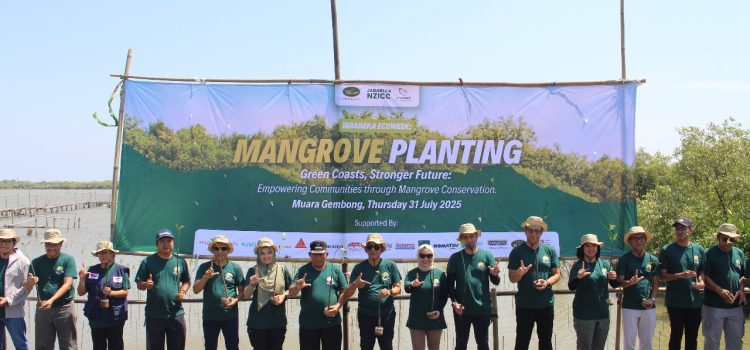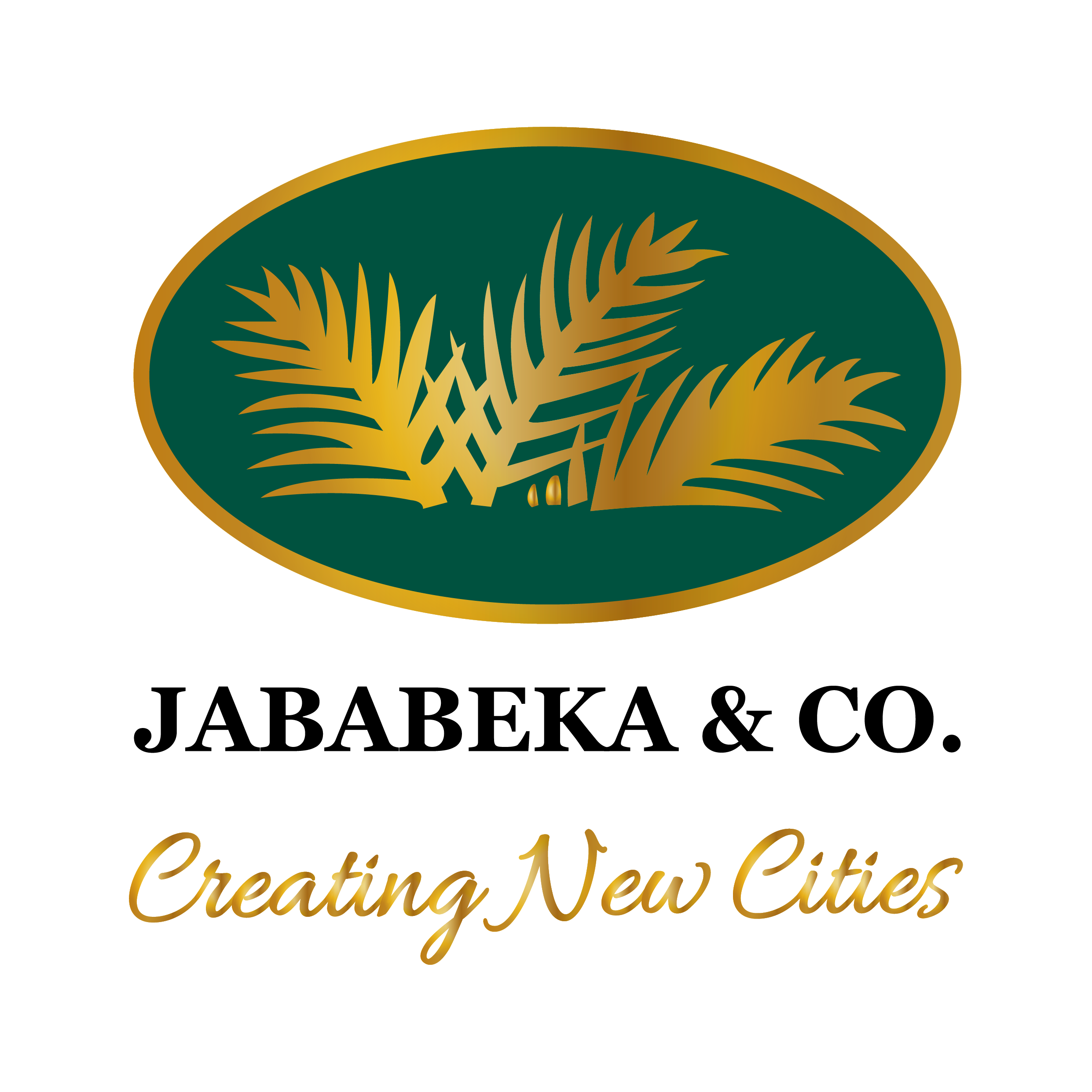Support Indonesia Carbon Neutral 2060, Jababeka and Industrial Estate Tenants Plant 100,000 Mangroves

Muara Gembong, July 31, 2025 — PT Jababeka Tbk., as a pioneer of modern and environmentally conscious industrial areas in Indonesia, continues to demonstrate its commitment to building industrial areas that are not only economically productive but also socially and ecologically sustainable. Through the annual Jababeka Ecoweek 2025 program, which is a continuation of the previous Jababeka Ecoweek activities, Jababeka collaborates with various parties to promote collective action in preserving the environment and empowering the communities around the Jababeka Industrial Estate.
Last year, the Jababeka Ecoweek 2024 activities successfully realized the planting of 50,000 seedlings of the Rhizophora mangrove species in stages at Bahagia Beach, as a form of coastal protection against abrasion, tidal flooding, and the creation of a green belt that supports environmental quality and climate change mitigation.
Continuing in the same location as the previous year, this year’s mangrove planting is again focused on Bahagia Beach, Muara Gembong, but with a larger scale of collaboration and carbon absorption targets. With the theme “Green Coasts, Stronger Future: Empowering Communities through Mangrove Conservation”, this year’s activity aims to strengthen the coastal green belt as a natural protector against abrasion, a windbreaker, and a fortress against the impacts of climate change.

This initiative also supports Indonesia’s national target of Carbon Neutral 2060, which is the government’s commitment to achieving a balance between carbon emissions released and those absorbed by ecosystems by 2060 in order to address the climate crisis and maintain environmental sustainability.
“The planting of mangroves is not just an annual ceremony, but part of our long-term strategy in building an industrial area that is resilient to climate change. We want to prove that economic growth and environmental preservation can go hand in hand. Through collaboration with tenants, local communities, and the government, we hope that the green coastal belt we are building can become an ecological legacy that protects coastal areas while also empowering the community,” said Vega Violetta, Director of PT Jababeka Infrastruktur.
As part of the Jababeka Ecoweek 2025 series, Jababeka collaborates with the Preserve Foundation, an environmental care community formed by active students of President University, to present two programs involving the role of youth in environmental issues. These activities include the planting of 1,000 trees at the Jababeka Botanical Garden on June 20, 2025, as well as a seminar titled ‘Exploration in Environment for Better Future’ on July 22, 2025. This seminar serves as a collaborative forum that brings together students, communities, and environmental practitioners to share insights and encourage real action for sustainability.
This year, the Preserve Foundation also attended the Mangrove Planting Ceremony of Jababeka Ecoweek 2025. The Preserve Foundation expressed its utmost appreciation for the opportunity to participate in this activity, which holds significant meaning not only as an effort for environmental preservation. But also as a real contribution in maintaining the balance of the coastal ecosystem and the natural habitat of domestic fauna.
“Preserve Foundation sees great potential in mangrove forests as a support for a sustainable and inclusive tourism-based creative economy. We are committed to continuing to forge strategic collaborations with Jababeka and various other stakeholders in developing the active role of the youth as agents of environmental change. Through strong synergy, we are optimistic that this conservation movement can become a collective movement that grows sustainably and has a wide impact on society and the environment,” said I Gusti Ngurah P. Prayata Anom or Pray, Chairman of Preserve Foundation.

This mangrove planting involves more than 15 tenants in the Jababeka industrial Estate, including PT Hanes Supply Chain Indonesia, PT KAO Indonesia, PT Sika Indonesia, PT Fukoku Tokai Rubber Indonesia, PT Nippon Steel Chemical & Material Indonesia, PT Astemo Bekasi Manufacturing, PT Dexa Medica, PT Sari Takagi Elok Produk, PT Mane Indonesia, PT Komatsu Undercarriage Indonesia, PT Piaggio Indonesia Industrial, PT Bima Adikarya Persada, PT Nippon Indosari Corpindo, and PT United Tractors Pandu Engineering. The type of plant being planted is Rhizophora sp., which has the ability to absorb carbon and heavy metals, as well as maintain water quality and coastal ecosystems. The total number of mangrove trees planted is estimated to be able to absorb carbon up to 200 tons CO₂e per year. Jababeka itself aims for this program to contribute to the carbon absorption of more than 400 tons of CO₂e per year.
Not only involving tenants, this activity also engages the coastal community, especially the Kelompok Sadar Wisata (Pokdarwis) fostered by the Bekasi Regency Tourism Office. In addition to planting, the community is also empowered to develop creative economic products based on mangroves, such as handicrafts and processed foods.
“We feel proud to be continually involved in the Jababeka Ecoweek activities. This program is not just about planting mangroves, but also about opening opportunities for the community to care more about the environment while developing local economic potential. With the support from Jababeka and the government, we are more enthusiastic about processing mangrove products into sellable items that can be recognized more widely,” said Sonhaji, Chairman of the Alipbata Beach Happiness Pokdarwis.
This event was also attended by the Head of the Department of Tourism of Bekasi Regency, Drs. H. Iyan Priyatna M.Si. He fully appreciates the program that has been implemented by Jababeka and Tenant since 2019.
“I really appreciate and am proud of what Jababeka and this Tenant have consistently done since 2019 in planting thousands and now approaching 100,000 mangroves in this area. Hopefully in the future, Jababeka Ecoweek can achieve a Muri Record,” said Iyan Priyatna.

Appreciation also came from Vina Sari Nalurita, S.STP, M.Si, Head of the Economic and Natural Resources Division, Bappeda of Bekasi Regency, who also attended this event representing Ir. H. Didik Setiadi, MM, Acting Head of the Regional Development Planning Agency of Bekasi Regency.
“We express our deepest gratitude to Jababeka and its tenants, as well as Cikarang Listrindo who have contributed a lot here; we certainly appreciate it. We hope that the empowerment will continue in the future,” said Vina Sari Nalurita.

This program simultaneously reinforces Jababeka’s position as the first and only industrial area in Indonesia to achieve the Green PROPER award from the Ministry of Environment and Forestry (KLHK RI) for the year 2023. This achievement shows that Jababeka has implemented environmental management in line with government programs, as well as being a tangible proof of its commitment to driving sustainable innovation and exceeding environmental compliance standards.
“This Green PROPER achievement is evidence that the sustainability measures we have undertaken, including the mangrove planting program in Muara Gembong, are not only in line with national policies but also provide a real impact on the ground. This is a manifestation of our commitment to continually present an industrial area that is not only productive but also cares for the sustainability of ecosystems and the lives of surrounding communities,” added Vega Violetta.
In addition to Jababeka Ecoweek, various other social initiatives are also being implemented, such as the Gerakan Sehat Atasi Stunting (GETAS) and the Jababeka Scholarship Program, aimed at improving child nutrition and access to education for underprivileged families around the Jababeka Industrial area. Through this series of programs, Jababeka asserts itself not only as a pioneer of modern industrial zones but also as a catalyst for green transformation in Indonesia. Commitment to collaboration, sustainability, and empowerment serves as the main foundation for creating an industrial ecosystem that is adaptive to the future.
Jababeka hopes that every step taken — no matter how small — can trigger a wave of change towards a greener, more resilient, and globally competitive Indonesia. Because for Jababeka, the industry of the future is an industry that coexists in harmony with nature, grows alongside communities, and makes a real contribution to the earth.
